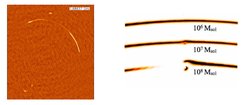ERC starting grant for Simona Vegetti
Dark matter is believed to make up 85% of the total mass in the Universe – but most of its properties still need to be constrained. Currently, the favoured cosmological model, the Cold Dark Matter (CDM) paradigm, assumes that dark matter is cold and collision-less. This model has been very successful in describing the Universe on large scales; however, at smaller galactic and sub-galactic scales it remains untested.

High-resolution gravitational imaging: The image on the left shows VLBI data for the lens system B1938+666. The long arc is a strongly lensed image of a distant background galaxy. The image on the right shows how different mass substructures in the lens galaxy would affect the gravitational arc of B1938+666.
All dark matter models predict that structures from through gravitational collapse from small, primordial density fluctuations; the (dark) matter distribution therefore should be clumpy and low-mass structures should be scattered around more massive galaxies. The details of this distribution and in particular specific scale where clumps appear depend on the properties of the dark matter particles. The differences between models are largest for low-mass structures, which are inherently difficult to detect and measure in more distant galaxies.
This is where gravitational lensing comes in: large mass concentrations not only bend the light of background object, they can also amplify the light coming from the source. If there are low-mass concentrations in a lens galaxy, this will change the gravitational potential locally and lead to a change in the surface brightness distribution of the lensed image, which would otherwise be smooth.
Simona Vegetti developed a computer algorithm to analyse the extended arcs observed in strong gravitational lens systems to detect such low-mass dark matter substructures. To place tighter constraints on the amount and distribution of substructures, she needs high-resolution data of many different strong lens systems. The ERC grant, which augments her funding for the next five years, will allow here to hire additional researcher to further refine her technique and obtain additional high-quality radio data for even more lens systems.
ERC Starting Grants are designed to support excellent researchers at the beginning of their careers. Applications are open to all fields of research and proposals are selected on the basis of excellence as the sole criterion.
